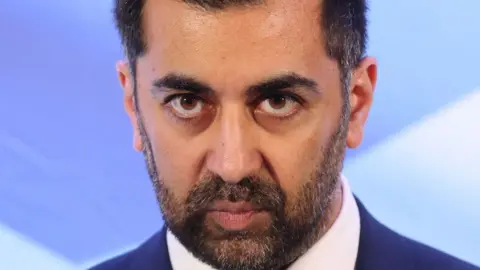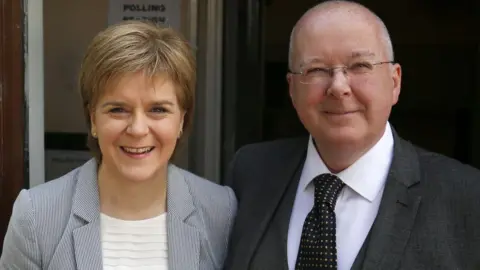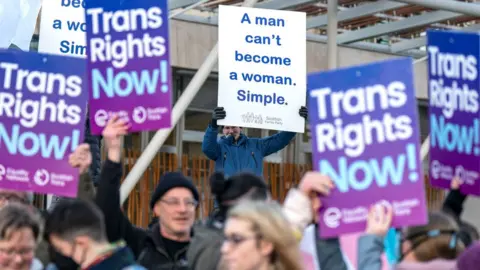How many more difficult days for SNP's Humza Yousaf?
 EPA
EPAAs police officers sealed off the home of his predecessor and raided his party's headquarters, Humza Yousaf conceded that the SNP was having a "difficult day".
The new first minister made a bid for understatement of the year inside his opening week in office.
And he already has a stack of other issues piling up in his in-tray, with MSPs bickering about the SNP's partnership with the Greens and a looming legal deadline in the row over Holyrood's gender reforms.
How will these pressures weigh on the new SNP leader and first minister, and what could it all mean for Scotland going forward?
From stability to turmoil
Following on from almost 20 years of stability under Alex Salmond and Nicola Sturgeon, perhaps the SNP was always destined for period of turmoil.
But the speed and scale of the meltdown in the wake of Ms Sturgeon's departure has still shocked almost everyone in Scottish politics.
The leadership race itself was remarkably fiery, with serving finance secretary Kate Forbes torching her party's record in government and Ash Regan claiming it had gone soft on independence.
Mr Yousaf was unashamedly the Sturgeon continuity candidate, but even he embraced the need for sweeping changes at SNP HQ following the resignation of chief executive Peter Murrell, who took responsibility for misleading the media over membership figures.
The new leader said that one of his first tasks would be to "get up to speed very quickly on the financial health of the party", with a transparency review to be carried out.
But it was the review by Police Scotland which came to the fore in spectacularly public fashion.
Precisely which part of the party's books are of interest to the police remains fairly opaque, and in any case it would be foolish to speculate when their investigation is live.
But it underlines the need for Mr Yousaf to get to grips with the governance of his party.
 PA Media
PA MediaThe fall in membership subscriptions will have real financial implications, for all that nobody other than Mr Murrell will admit to having known about it.
And senior members have been raising questions about internal issues for some time. MP Douglas Chapman quit as Treasurer in 2021, saying he had not been given enough information to do the job; days later Joanna Cherry also left the National Executive Committee claiming she was unable to improve transparency and scrutiny.
Following his first NEC meeting on Saturday, Mr Yousaf said there were "lessons to be learned", and that the party's internal structures needed to carry the confidence of members and reflect the party's "broad tent" approach.
If there is much to be done in-house at SNP HQ, there is also the issue of bringing the party's representatives back together in parliament.
What are the looming issues?
Mr Yousaf failed to tempt Ms Forbes back into the cabinet with the offer of a demotion. Keith Brown - elected deputy leader of the SNP by members - also left the top team, while two other ministers turned down jobs in his administration.
There are some unhappy faces on the SNP's back benches, and after decades of iron discipline they are no longer shy about speaking out. A former cabinet secretary, Fergus Ewing, appears to be openly campaigning against his party's partnership with the Greens.
This kind of rebellious talk is the sort of thing Nicola Sturgeon never had to contend with - at least not until the final months of her reign, and the row over gender reform.
And that too is a looming issue for Mr Yousaf.
Ms Sturgeon's team had hoped to put the issue to bed with a series of marathon parliamentary sessions in December, when MSPs passed the Gender Recognition Reform Bill.
But then the UK government blocked the legislation in an unprecedented show of constitutional muscle.
 PA Media
PA MediaMr Yousaf has all but promised to challenge that veto in the courts, and the Greens have been clear they will quit the government if he does not.
The deadline for launching a judicial review is due in the coming weeks.
So before he even gets to his second Holyrood question session, Mr Yousaf will have to contemplate a courtroom showdown on a contentious issue which has already split his party.
Broadly, so far we have been talking about internal issues for the SNP. But there is clearly an external political impact too.
The image of that blue police tent being erected in Nicola Sturgeon's drive was beamed out on TV and smartphone screens across the country.
What could that mean for her oft-cited legacy of electoral domination?
What are the polls suggestion?
Opposition groups have certainly detected an opportunity. Labour in particular are openly licking their chops and demanding the country go to the polls.
You can barely turn a street corner in Scotland these days without tripping over Sir Keir Starmer or Anas Sarwar.
Professor Sir John Curtice says the four polls since Ms Sturgeon quit suggest that support for the SNP has "eased significantly", despite the fact backing for independence has not slipped.
He told the BBC's Good Morning Scotland programme that those votes are "primarily going to the Labour Party", with the SNP's lead over their red rivals having halved since February.
Sir John also suggested that Mr Yousaf was not proving as popular with the public as some in the SNP had hoped, and that his association with the Sturgeon regime may now prove a hindrance rather than an asset.
Polls are of course just polls - momentary snapshots of a carefully weighted slice of public opinion.
We may well have a much more tangible test in the coming months though, on account of something else that happened during Mr Yousaf's first week in office.
Margaret Ferrier, the MP for Rutherglen and Hamilton South, is facing a 30-day suspension from the House of Commons for breaking Covid rules - and thus potentially a recall petition and by-election.
Ms Ferrier now sits as an independent, but won the seat for the SNP with a majority of 9.7% in 2019. Having changed hands at the last three elections, it was already a key target for Labour.
 PA Media
PA MediaShould a contest come about, both the SNP and Labour will be absolutely desperate to win, and establish real electoral momentum.
If Labour can take the seat, Sir Keir will paint it as the first step on the road to Downing Street. If the SNP hold it, then Mr Yousaf can say he's steadied the ship and could continue Ms Sturgeon's run of extraordinary electoral success.
For all the talk of momentum, though, the next Holyrood election is not due until 2026. There may not be a general election until the start of 2025.
So for all the challenges which undoubtedly face Mr Yousaf, he does have some time to get to grips with the job and put his own stamp on the Scottish government.
We should also remember that he was the choice of the bulk of SNP parliamentarians, with by far the most endorsements, and was always the candidate best-placed to reunite the party.
Politics moves incredibly fast in this digital age. Never mind a week being a long time in politics, narratives can change overnight - for better or for worse.
Humza Yousaf has been around Scottish politics long enough to know that better than most. He said he felt like the "luckiest man in the world" when he became SNP leader, and for all the blows which followed he will not have felt his luck has run out just yet.
But he will be under no illusions that there may well be more "difficult days" ahead too.
